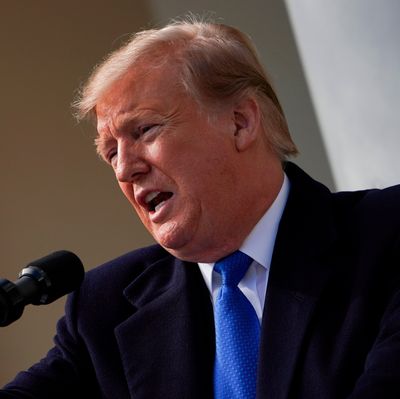
At worst, President Trump’s claim of emergency powers that would allow him to expand barriers on the southern border is a gross violation of democratic norms. At best, it is a craven ploy to cover his own blundering. Either way, it is a devastating indictment of his capacity to handle his job.
Begin with the worst-case scenario. As a matter of principle, the Constitution establishes a system that requires the House, Senate, and the president to approve new laws. In some cases, expediency requires the president to act unilaterally. Those rare cases are not defined as emergencies because they’re important — lots of policy is important, even life-threatening. The emergencies are cases where the executive needs to act in an especially urgent way, and where congressional involvement may not be practical.
Most of the uses of emergency powers involve foreign policy, an area where Congress has (for better or worse) ceded most of its authority to the president anyway. Presidents have not been able to use emergency powers to simply roll over congressional opposition. Bill Clinton considered health-care reform an extremely vital problem with literal life-and-death consequences — and he was right — but he never contemplated using some form of emergency powers to impose the reforms he couldn’t get Congress to enact.
Trump has of course tried to portray his power grab as just such an emergency. But illegal immigration is nothing like the kind of sudden crisis that justifies rapid action. It is a decades-long policy dispute, with border crossings now at levels well below that of a decade ago. The closest thing to a crisis is a recent surge in migrants seeking asylum, a process that entails crossing the border legally, and for which a wall is completely irrelevant. What’s more, Trump’s non-solution would take years to complete. The president’s lack of urgency to address the alleged border crisis during his first two years, when he had unified control of government, attests to his disingenuousness.
Trump’s extemporaneous commentary defending his emergency decision repeatedly gave away his own rationale. He admitted he could have passed border funding through Congress during his first year and a half, but he was “too new to politics,” and his fellow Republicans “didn’t step up.” He framed the border wall as a gambit for his campaign (“I’ve already done a lot of wall for the election — 2020.”). And he admitted the emergency declaration was a luxury rather than an emergency (“I didn’t need to do this. But I’d rather do it much faster.”). He is clumsily undermining his already-shaky legal case, while making it plain his ploy is to claim Executive powers to override an area of control for Congress.
Lou Dobbs, a Fox Business Network host who frequently speaks to the president both through the screen and on the phone, expressed the premise of using a emergency order to circumvent democratic debate. “I really believe that the way forward here is for him to declare a national emergency, and simply sweep aside the recalcitrant left in this country,” he said on air last month. “They have obstructed, resisted, and subverted for far too long.” Note, in particular, the chilling authoritarianism of the term “subverted” to describe a policy dispute between coequal branches of government.
Trump echoed this spirit in his ill-fated national address touting the border wall, when he concluded, “When I took the oath of office, I swore to protect our country and that is what I will always do so help me God.” In fact, the oath of office commits the president to protect the Constitution, not “the country.” The distinction between the two things is substantial. The actual oath binds Trump to a form of government and the rule of law. Trump’s version of it invests in his own office unlimited authority to define security and carry it out as he alone sees fit. In his remarks defending his decision, Trump chillingly praised anti-drug policy in authoritarian China, which he claims has achieved total success by brutalizing criminals. His argument for a wall could just as easily be used to justify overriding criminal-justice protections.
Few Republican officials have echoed this kind of bluntly fascistic rhetoric. Instead, they have responded to the threat much as they have responded to the broader currents of authoritarianism emanating from the Oval Office. First they pushed back quietly, and then finally relented:
As always, the mere fact Democrats are decrying Trump’s abuses is causing Republicans to rally around them. “We are becoming more unified as the Dems push out there,” a Republican House member tells John Harwood. “Real optimism on our side based upon the extremists on their side.”
If Trump were to succeed, he would distort the effective meaning of the Constitution beyond recognition. That is precisely why his ploy is unlikely to survive the legal challenges. The Supreme Court’s five Republican justices may stretch the Constitution to defeat liberal policies they abhor, like universal health insurance, but they probably don’t care about the wall and have no reason to spend their reputational capital on a decision upholding it.
The anticipation that courts will smack down Trump’s attempted power grab has created some complacency about the brazenness of his attempt. The clever take in Washington is that Trump is claiming emergency powers knowing full well he will probably lose.
But it hardly vindicates the president. Trump impulsively engineered a government shutdown out of the mistaken belief that somehow it would give him leverage over Democrats, and without any understanding of the humanitarian fallout. After he quickly realized it wouldn’t, he made almost no effort to negotiate in good faith, even though it certainly would be possible to imagine immigration policies most Democrats and some Republicans would want enough to authorize more border-security funding.
Having deliberately inflicted pain on his own country on a whim, he is defying democratic norms in order to extricate himself from the humiliation of a retreat. That he is likely to lose may mitigate the offense, but doesn’t excuse it. Trump has at minimum proven that he lacks the temperament or basic competence to serve as president of the United States.
This post has been updated throughout.






























